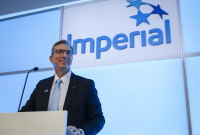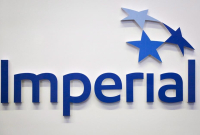Support strong Canadian climate journalism for 2025
One of the oilpatch's most outspoken critics of Canadian federal and provincial energy policy is retiring at the end of this year.
Imperial Oil Ltd. announced Tuesday that chairman and chief executive Rich Kruger will step down after leading the Calgary-based company, which is about 70 per cent owned by Texas-based Exxon Mobil Corp., since 2013.
In his role, Kruger complained publicly often about red tape, focusing in recent years on how long it took to win Alberta regulatory approval for the two-phase, 150,000-barrel-per-day Aspen thermal oilsands project, first proposed in 2013.
Imperial announced it would go ahead with Aspen late last year, within months of finally winning approval for the $2.6-billion project.
But it was put on hold in March due to what Kruger called market uncertainty caused in part by the former provincial NDP government's oil production curtailment program enacted in January to reduce a glut of oil trapped by output outgrowing pipeline capacity.
"We cannot invest billions of dollars on behalf of our shareholders given the uncertainty in the current business environment," he said at the time.
The CEO has also taken the federal government to task over Canadian competitiveness, calling for tax parity with the U.S. and declaring Ottawa's passage of Bill C-69 to revamp how energy projects are approved would cause Imperial to reconsider any new investments in Canada.
In August, Kruger threatened to drastically reduce Imperial's crude-by-rail shipments because provincial curtailments had hurt the profitability of shipping by rail to the U.S. Gulf Coast.
He charged the programs were "no way to run a railroad" and added he didn't agree with rivals Suncor Energy Inc. and Canadian Natural Resources Ltd. that the government should reduce curtailments for companies that add rail export capacity.
"The last thing we want to do is ingrain the concept of curtailment, that you get relief from curtailment if you get rail," he said on a conference call. "I want relief from curtailment and no curtailment. I want it done!"
While CEO, Kruger oversaw the successful construction and commissioning of the second phase of Imperial's Kearl oilsands mining project.
He was not available for an interview on Tuesday.
"We believe it is fair to say that Rich brought a substantially higher level of intensity to the platform than the one he inherited when he joined Imperial in 2013 and that there will be some lasting effect from his tenure in the seat," said analyst Jon Morrison of CIBC Capital Markets in a report.
The CEO was born in Minnesota and trained as a mechanical engineer. He began his career at Exxon in 1981 and held various technical and management positions in posts in the former Soviet Union, Africa, Asia-Pacific and the Middle East before coming to Canada.
Financial analysts said they expect little change in direction under Brad Corson, a 36-year Exxon employee who will take over as president immediately and become chairman and CEO on Jan. 1.
Corson, who was born in Illinois, joined Exxon in 1983 as a project engineer and has held a variety of technical, operations, commercial and managerial assignments around the world, including leadership positions in Hong Kong and London.
He was appointed president, ExxonMobil Upstream Ventures, in 2015, where he was responsible for ExxonMobil’s global upstream acquisition and divestment programs.
Companies in this story: (TSX:IMO, TSX:SU, TSX:CNQ)





Comments